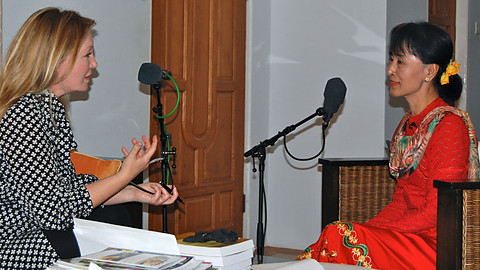“My castaway this week is…”: Or having a real conversation, with help from Kirsty Young, Aung San Suu Kyi, and Michael Rosen
Date posted: Sunday 26th May 2013

I have a bit of a fantasy that one day I will appear on BBC Radio 4’s Desert Island Discs, where Kirsty Young asks me about the eight records I would take with me to my desert island, along with my favourite book and one luxury item. During the programme Kirsty gently quizzes me about my life, in her beautiful Scottish accent, and I explain each record‘s significance for me and respond to her charm by revealing insights into my life and times.
Part of this programme’s appeal is that it is so well researched; where Kirsty Young’s questions are carefully chosen to help her guests give just the right amount of information. Some castaways are quite evasive, and by the end of the programme you are none the wiser about what makes them tick, while others seem totally and disarmingly candid. Actor and film director Tim Robbins seemed not to have prepared at all, and there were long pauses while he carefully pondered his answers, but it was a brilliant interview, as it gave the impression of being completely spontaneous. Kirsty recently got the most out of her 30 minutes with Damien Hirst, due to her detailed preparation and genuine insight into his art. She didn’t bat an eyelid when he recounted how as a young man he used to burgle people’s homes, described his vast wealth and referred to his art as ‘a type of criminal activity’. I’d have asked him if he ever paid back the victims of his crimes. She just said, “Let’s have another record.”
Soprano Elisabeth Schwarzkopf famously chose seven of her own recordings to take with her. Before I had heard about that I thought that prima donna referred to all pop music before 1984. Kirsty travelled all the way to Myanmar to interview Aung San Suu Kyi, and was so wound up and overawed that she almost forgot to ask the Burmese politician about the piece of music she would most like to take with her. Brilliant stuff.
The nearest I have got so far to realising my fantasy was when I was asked to appear on Michael Rosen’s Radio 4 Programme Word of Mouth. My role was to talk about selective mutism, where children who are confident talkers at home find themselves often completely unable to speak in public, and typically at school. I started preparing from the minute I knew I was going to be on the programme. I listened to other people in radio interviews: the ones who did it well, and those who were less successful. I realised that the programme producer plays a crucial role in preparing the interviewer. I had spoken on the phone to the producer and assumed that she would use this information to prepare the questions that Michael Rosen would ask me.
I was really excited at the thought of going into Broadcasting House. Maybe I would have a brief chat with Kirsty Young in the canteen, or even rub shoulders with Matthew Parris in the men’s room. No such luck. Our recording took place in a small studio several streets away from the BBC’s headquarters. As I walked into the foyer, there was Michael and the producer hurriedly looking at a DVD about selective mutism. Although he was clearly not as well-prepared as Kirsty Young, Michael Rosen was brilliant. His first question was the only one I hadn’t prepared for: “How many children in the UK have selective mutism?” To which I blew a raspberry and practiced my ‘Gallic Shrug’. To which Michael replied, “Obviously not a good question to start with. Shall we edit that bit out?”

Michael Rosen: going on a bear hunt or listening to Michael Jones?
We had a good chat afterwards and he told me the story of how Going on a Bear Hunt was created. (He envisaged lots of children in fancy dress marching to the sound of a brass band in a parade through the streets of a small town. Helen Oxenbury created images from the Suffolk coast, and one of the most popular works of children’s fiction came into being). I can’t say that I answered the questions really well, and listening to the recording, I think I messed up my chance to explain the difference between shyness and selective mutism. However I did feel that Michael Rosen was deeply interested in the subject. He didn’t have a script in front of him, and let me talk for as long as I wanted. It felt more like a conversation, where two minds were meeting about a subject of mutual interest, so I quickly relaxed and forgot about the microphones.
I think we can apply these principles to how we talk with children. We need to know about their lives and interests and be genuinely interested in what they have to say. I’m not saying we should talk to little children as if we were Kirsty Young, as the results might turn out like this:
Kirsty Young: My castaway this week is three and a half year old Charlotte. Charlotte, since the age of three you have been in preschool. Your mummy and daddy adore you and you adore your little brother (most of the time). Your first work of art, Mr Potato Head and Lots of Purple and Blue Spots has been on public display on your Nan’s fridge for the last six months. You once famously said, “My best colour is blue, or is it orange?” What did you mean by that?
Charlotte: I didn’t know my colours.
KY: This kind of approach to your art leaves the critics baffled. What’s your first piece of music?
Charlotte: Chris Rea singing The Road to Hell. My dad sings this in the car on the way to my Nan’s house.
More tip top interviewing ensues, with gently probing questions….
KY: Record number six
Charlotte: I can only count to five.
More charm from Kirsty until finally…
KY: You’ve got the Bible and Shakespeare, what book would you take with you?
Charlotte: The Story of Peppa Pig
KY: And your luxury?
Charlotte: My teddy
KY: Thank you for sharing your Desert Island Discs with us.
Charlotte: Is it home time yet?
To listen to the interview about selective mutism with Michael Rosen, click here.
To read more about the subject, including a comparison between shyness and selective mutism, click here.
And what favourite piece of music, your favourite book and luxury would you take on your desert island? Mine would be I’m a Believer by The Monkees, Jayne Eyre by Charlotte Bronte and a suitcase full of family photos.
https://www.youtube.com/watch?v=j4xoxFrRA2Q
Sign up for Michael's weekly blog post by clicking here!
How funny – my daughter’s earliest memory is Road to Hell too! You’re so right Michael, with all the emphasis on language stimulation these days, we can get so bogged down with reframing and expanding children’s utterances, providing a running commentary – or should it be forced alternatives? – that we can completely lose sight of the fact that often the best thing to do is to follow Michael Rosen’s lead, show genuine interest and say as little as possible!
Research clearly indicates that correcting and questioning reduce the length of children’s responses, while a ‘phatic’ or affirmative style (Wow! You’re right! Hey, this is good!) dramatically increases sentence-length and encourages children to develop their own narratives.
Must dig out that Chris Rea tape…
Hi Maggie
My other favourite programme is ‘Great Lives’ chaired by Matthew Parris. He and his guests were discussing Primo Levi. One of them described an incident in Levi’s life. Matthew Parris was so involved in the discussion that he said, ‘Good Lord!’ That genuine response led to his guests becoming even more voluble.
This type of style can have its down side: at least on live recordings for the radio.
On one programme his guests were Ruby Wax and A.N. Other, discussing Carl Jung. Ms Wax, who is no longer an actress/comedienne but works in private practice as a Jungian therapist went ballistic when Professor Other dared to suggest that Jung might have got a few things wrong. No amount of ‘Good Lording’ was going to make Ruby Wax calm down!
Michael
You do make me laugh, mr jones!
I fully agree with the importance of not taking over and beng an equal partner. I like Marion Dowling’s idea of being a ” thinking companion”, something that I heard Chris Pascal pick up on once at a training event too. It suggests a very unpressured and relaxed environment – a key condition for promoting communication of any kind, not just verbal.
Hi Deborah
That’s an interesting concept. I think it helps when having conversations to know something about what interests the child. This can be simply by looking at what they are wearing: a Peppa Pig t-shirt of a pair of Thomas wellies is usually are usually very big clues about where to start.
What would you choose for your desert island?
Ok, I’m going to own up that I too imagine being on desert island discs. I struggle to reduce my favourite music to 8 recordings but the book: The Poisonwood Bible given to me by none other than Michael Jones himself. How well you know your friends, Michael! You are clearly a person observer, young and old, and we can all learn from that.
Hi Elly!!
Yes, that is a very powerful book, and I can see why it might be so significant.
I have fun deciding what to take with me, and though Jane Eyre would be my all time favourite, for many years I have had Rosamund Lehmann’s The Ballad and the Source as my top book.
However recently I have been reading everything by Jonathan Coe, and maybe I would have ‘The Rain Before it Falls’ as my next best choice. I would love to write a book like that.
I imagine that I would spend all my time worrying that my shelter was going to fall down, so wouldn’t have much time for reading of writing!!
Love from Michael